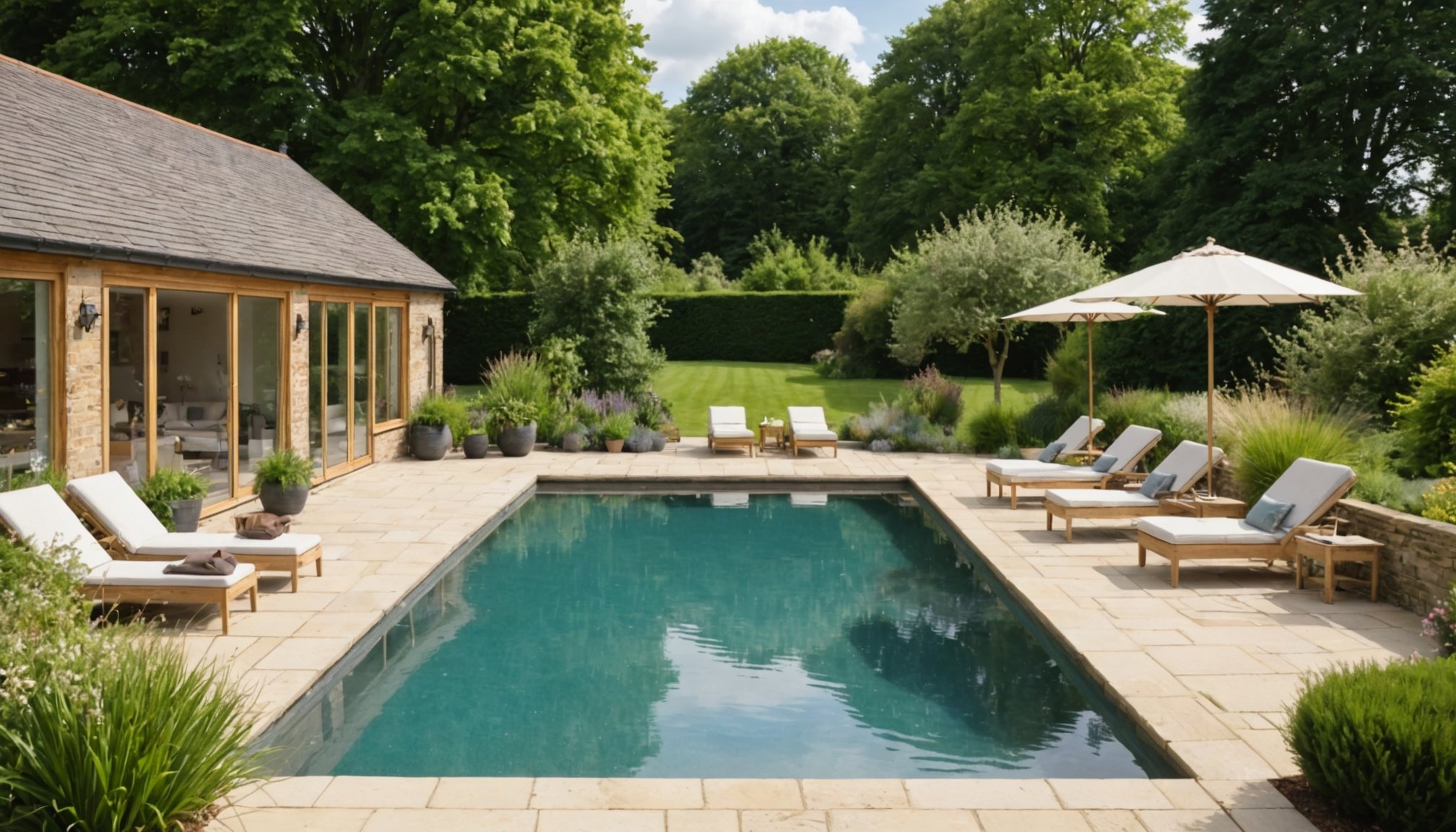Design Principles for an Organic Pool
Creating an organic pool means more than just installing a swimming area. It involves a thoughtful integration with the natural surroundings, ensuring the pool complements the countryside environment seamlessly. Crucial to this is the choice of pool design, which should embody the essences of nature.
In organic pool design, the use of curves and irregular shapes is fundamental. Unlike traditional pools, which often feature sharp, geometric lines, an organic pool mimics the gentle, flowing forms found in natural aesthetics. This approach not only enhances the pool’s visual appeal but also makes it feel like an integral part of the landscape.
A découvrir également : Essential Tips for Preserving Water Clarity Amidst the UK”s Peak Pollen Season
Distinctive features also include elements such as stone edges, natural plantings, and water features that mirror those found in rivers and lakes. These components are essential for fostering a symbiotic relationship between the pool and its natural environment.
When approaching a project with countryside integration in mind, it is vital to consider the existing flora and terrain. The goal is to ensure the pool enhances rather than disrupts the ecological balance. Ultimately, pool design that reveres nature’s inherent beauty and complexity allows for a space that feels timeless and enduring.
Sujet a lire : Essential Guide: How Frequently Should You Monitor Water Quality in Your UK Home Swimming Pool?
Material Suggestions for Eco-Friendly Pools
Building an eco-friendly pool begins with choosing the right materials. Opting for sustainable materials like recycled steel or organic construction elements can significantly reduce environmental impact. Recycled steel, for example, is not only strong but also manufactured with minimal energy compared to traditional steel, making it a top choice for conscientious builders.
Local materials, such as natural stone from nearby quarries, can also offer environmental benefits. Using local resources reduces the carbon footprint associated with transportation. Additionally, these materials often blend seamlessly with the surrounding environment, enhancing the pool’s aesthetic appeal.
Innovative eco-friendly technologies are at the forefront of sustainable pool construction. Solar heating systems, for instance, utilize sustainable energy to maintain a comfortable water temperature, reducing reliance on fossil fuels. Similarly, saltwater chlorination systems use natural salt to purify water instead of chlorine, minimizing chemical usage.
For those considering a new pool or renovation, integrating these eco-friendly choices can deliver both environmental benefits and long-term cost savings. Furthermore, engaging with local experts and suppliers can provide additional insights into the most effective sustainable practices and materials suited to your specific location and needs.
Eco-Friendly Features to Incorporate
In the quest for a greener lifestyle, embracing energy efficiency in your home is a crucial step. Solar heating is a standout among these systems. It harnesses solar power to maintain a comfortable indoor climate, significantly reducing reliance on fossil fuels. Energy-efficient systems are not limited to heating. There are innovative options available for smart water management as well. These technologies allow for the careful monitoring of consumption, ensuring you only use what is necessary, conserving resources while reducing costs.
Natural filtration systems offer an environmentally friendly alternative to traditional chemical-based filtration methods. These systems often employ materials such as plants and sand to purify water, reducing the need for synthetic substances. By incorporating sustainable practices and tools in your home design, the impact on the environment can be minimized without sacrificing convenience or comfort.
Adopting eco-conscious technologies is not only about reducing your carbon footprint. It’s a comprehensive approach to living sustainably. The integration of solar technology and smart systems sets a precedent for future living spaces. Aspiring for efficiency and sustainability ensures homeowners have a positive influence on both their immediate surroundings and the planet.
Landscaping Ideas for a Harmonious Environment
Integrating native plants into your landscaping designs can offer numerous environmental benefits. These plants are adapted to local conditions and require less water and maintenance, which supports sustainability while enhancing the beauty of your space. Choose species that are native to your region to ensure they thrive.
Besides plant selection, incorporating natural elements like gardens or water features can bring tranquility and harmony to your environment. A well-designed garden, for instance, can act as a visual and sensory buffer zone around your recreational areas. Consider different heights, textures, and colours to make your garden more dynamic and engaging.
Creating wildlife habitats is another beautiful way to ensure your landscaping coexists with nature. By incorporating birdhouses, butterfly gardens, or nesting areas for small creatures, you provide essential benefits to local wildlife while enriching your landscape’s ecological value. This not only supports biodiversity but also makes your poolside a rich habitat for observing and enjoying nature.
These landscaping ideas promote an integrated approach, ensuring your outdoor environment is both aesthetically pleasing and ecologically supportive. By adopting these ideas, you actively contribute to a balanced ecosystem right in your own backyard.
Regulatory Considerations for Pool Installation
Navigating the myriad of building regulations for pool construction in the UK can be quite complex. It is crucial for homeowners or developers to grasp these regulations to ensure compliance and avoid hefty fines or forced structure removal. Ensuring you understand the necessary protocols begins with identifying the specific permits required by local authorities.
Obtaining relevant permits is a fundamental step. Without these, any progress on pool installation may face legal setbacks. Permits assess various factors, such as environmental impact, safety measures, and adherence to zoning laws. Approval processes may differ depending on the type of property and locale, especially in rural settings where stricter guidelines often apply.
For those constructing pools in rural landscapes, special attention must be given to spatial and environmental restrictions. Rural areas may have unique challenges due to preserving natural scenery and existing ecosystems. Overcoming these challenges requires meticulously reviewing documentation and possibly consulting with specialists who understand the building regulations intimately.
Failing to secure the correct permits or violating building codes can lead to significant financial and legal repercussions. Therefore, understanding the importance of compliance is vital for a smooth, hassle-free pool installation experience.
Maintenance Tips for Organic Pools
Organic pools offer a harmonious blend of nature and functionality, requiring unique pool maintenance strategies. Embracing sustainability plays a key role in ensuring your pool’s longevity.
To begin with, nurturing the natural ecosystem within your pool is essential. A balanced ecosystem supports water clarity and reduces the need for chemical interventions. To maintain this balance, regularly monitor and adjust the presence of plants and beneficial bacteria, which naturally filter the water.
Sustainable maintenance practices help pool owners maintain an eco-friendly approach. Opt for mechanical filtration systems that work in harmony with the natural environment, such as biological filters and skimmers. These systems help manage debris without disrupting the pool’s eco-balance.
Consider the seasonal care of your organic pool to ensure year-round usability. In spring, focus on gradually cleaning and inspecting the pool infrastructure as plants and algae emerge from dormancy. During summer, consistently check water levels and maintain plant growth. As autumn approaches, skim off falling leaves and prepare the pool for the winter months ahead by reducing plant activity and possibly covering the pool for protection.
By adhering to these care tips, you can enjoy a sustainable and beautiful organic pool, while preserving its natural allure.
Successful Project Examples for Inspiration
When it comes to real-life projects, organic pool designs in the UK stand out as exemplary cases. These projects offer not only stunning aesthetics but also environmental benefits, seamlessly blending with their natural surroundings. A prominent case study showcases a project in Surrey, where a standard swimming pool was transformed into a thriving aquatic ecosystem. What makes this design truly remarkable is its use of biological filtration, which eliminates the need for chemicals, creating a safe and natural swimming environment.
Key features of these successful projects often include the incorporation of native plants that serve as natural filters, offering both beauty and functionality. Another notable project in Devon features a design that leverages solar energy for heating, making it both sustainable and energy-efficient.
Lessons learned from these innovative installations focus on the importance of location-specific planning. Each project emphasizes the need for a tailored approach, taking into account the regional climate and existing landscape. Furthermore, successful designs demonstrate the value of collaboration with ecological experts to ensure that the pool integrates seamlessly with local biodiversity. These real-life projects serve as both inspiration and a guide for aspiring eco-conscious designers.











